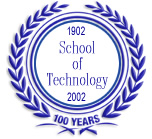
"Technology
and Us"
School of Technology
Centennial Symposium
An Extended Celebration

 |
"Technology
and Us" |
 |
|
|
"Technology
and the Future of History" There is a strong relation between the history of technology and the impact of technology in history teaching and research. The history of the Industrial Revolution (1760s-1840s), for example, is both the history of machines responding to bottlenecks in production (hand looms, spinning jennies, power frames, cotton gins, to focus just on textiles) _and_ the history of labor responding to new forms of organization (from home, cottage production to factory organization with work rhythms determined by the factory clock). Early nineteenth-century hand loom operators rejected factory organization and became Luddites, or machine- breakers. In the modern world, those resisting computerization also became known as Luddites. But, even if we are not Luddites, we still need to consider _how_ we will use computers in teaching. One study in the early 1980s found two Americas: one in which students were being empowered to learn BASIC and other programming skills to control computers, and another in which students were presented with ready-made computerized materials to which they could only respond. We need to make sure that Eastern Illinois University and other public universities are not relegated to the poorer choice because they either cannot afford the databases and materials that would empower the students to use computers to their fullest or they do not teach the skills that empower them to make the best use of that. I suggest that some recent business and Government uses of computers-online research, memo construction, collective decision-making is making the document housed in an archival registry a thing of the past. Since professional history came of age in the late-nineteenth century when the governmental archive registry was also being perfected, we may have to reinvent the meaning of history to encompass this new-found world in the future. Or risk becoming Luddites ourselves. |